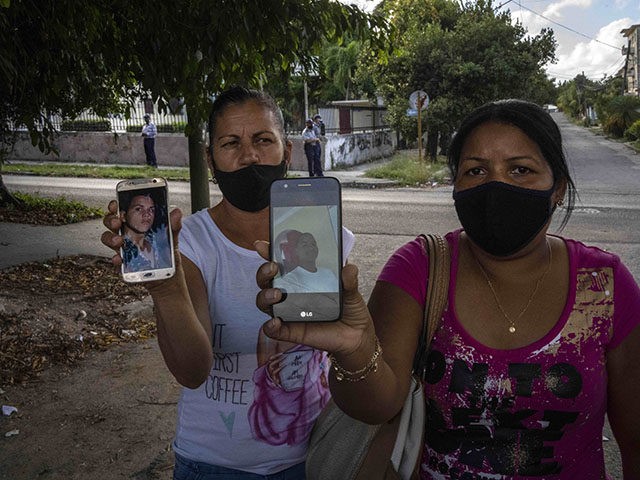Cuba began a new round of mass trials against accused participants in the July 11 national protests on Monday after concluding a trial of 21 people, including four children, last week.
Ten of the 21 defendants in last week’s mass trial, staged in the eastern city of Holguín, are reportedly on hunger strike as they await their sentencing next month. Prosecutors charged all 21 with “sedition” for a variety of alleged “crimes” that ranged from being in the presence of a protest to alleged physical assault, corroborated only with testimonies from state security officers, according to family present at the trial. The sentences requested ranged from 15 to 30 years.
Anti-communist protests erupted in nearly every municipality on the island on July 11, 2021, a result of years of civil society organizing and encouraging acts of peaceful civil disobedience. The protesters convened in town and city squares. A large majority of those whose arrests human rights groups confirmed had no prior experience with anti-communist opposition groups and many were children under 18. Modest estimates of the number of people who participated in the protests rose above 187,000 people.
In response to the protests, the Cuban Communist Party organized violent raids on the homes of suspected protesters, beating and, in at least one instance, shooting an unarmed civilian in his own home in front of his children. Cuban special forces known as “Black Berets” — meant to crush nonviolent dissidents — arrested thousands of protesters. Since then, the few who have been released from police custody have denounced mass arrests of individuals simply present outside near a protest, the widespread arrests of children, and the use of violence and threats to subjugate suspected protesters.
Communist Party agents also shut down internet access in the days following the protests, effectively cutting the island off and making it impossible for citizens to share videos of both the protests and the violent state response to them internationally.
A group of dissidents organized to track the arrest and prosecution of the accused protesters revealed, citing the relatives of those imprisoned, that a new round of mass trials against protesters would begin on Monday and is expected to end on Friday, according to the dissident outlet Cubanet. Cubanet reported that three different trials determining the fates of 45 people — nine of them under the age of 20 — are scheduled to begin on charges of “public disorder,” “disrespect” (a crime in Cuba), “resistance,” “assault,” and “insulting symbols of the fatherland.”
The protests follow what relatives of the accused have denounced as a sham trial in Holguín. The prosecution argued during that trial — according to legal documents obtained by Breitbart News — that the accused were all involved in either joining a mob of protesters on July 11 or attempting to document the protests. The poorly organized prosecutor’s statement disparages many of the defendants as being committed to “no activities of social use” and accuses one of the women on the list of being a prostitute. It offers little detail on what the four children in the trial actually did to land in prison, but requests a 15-year prison sentence for them, anyway.
The prosecutorial indictment obtained by Breitbart News also admitted on several occasions that little evidence exists tying the accused to the alleged criminal activity documented.
“From the crowd of people, without being able to determine who, counterrevolutionary slogans were shouted that fomented disturbances, as some profoundly lacerated patriotic feelings,” one part of the document read.
The prosecutor also documented the appearance of an armed communist mob to counter the peaceful protesters.
The court on Friday announced that it would not pursue 15-year sentences for the children, but reports out of Cuba suggest they may still spend as much as seven years in prison.
Relatives of the Holguín prisoners announced last week that ten of them have begun a hunger strike as they await their sentences. Cuban journalists reporting the hunger strike identified the mother of one of the detained, William Manuel Leyva Pupo, as the source of the news. Leyva’s family has repeatedly asserted to independent media that the 20-year-old — facing 18 years in prison — has suffered from longstanding mental health issues, making his case significantly different from the others so as to require a separate trial from the other 20 people.
The Holguín defendants are reportedly scheduled for sentencing on February 11.
Leyva’s mother, Idelsys Pupo, told the international outlet CiberCuba that family members “will support the [hunger strikers] on the outside,” without elaborating. Pupo used the word plantados to describe the hunger strikers, a term with a long history in Cuban anti-communist resistance.
The sham trials have attracted even more protests. On Monday, three anti-communist dissidents were arrested in front of the Havana Supreme Court for demanding freedom for all political prisoners in the country. The protesters reportedly shouted that the judicial processes were a “farce” and that the dissidents were not criminals.

COMMENTS
Please let us know if you're having issues with commenting.